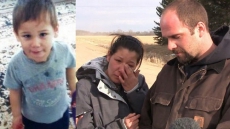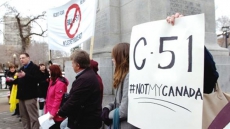VANCOUVER — Life-insurance providers have told the federal government its members are willing to lift the standard two-year exemption for suicides and pay out policies on people who end their lives through physician-assisted death, says the head of the industry's professional association.
Frank Zinatelli of the Canadian Life and Health Insurance Association said if someone follows the legislated process, which is expected to be announced as early as next week, then providers would pay out on policies that are less than two years old.
"The industry has determined that this is obviously something that the Canadian population wants and we're not going to stand in the way of that," Zinatelli said in an interview.
"We talked with our members and we determined that it makes sense that if the governments all make a decision along these lines that this should be … permitted then we want the policy intent to be carried out."
Life-insurance policies typically contain an industry-standard clause releasing providers from paying if a client commits suicide within two years of signing the contract.
"If you follow the process, which is outlined by the government or governments, then that possible exclusion won't be applied," Zinatelli said, adding that the law might differ between provinces.
The Canadian Life and Health Insurance Association's website says it was established more than 120 years ago. The voluntary association represents 99 per cent of the country's life- and health-insurance businesses.
Providers would not pay if a client misrepresented his or her health when signing the contract, as is currently the case, or if a policy specifically exempted the particular illness for which the holder sought a medically assisted death, added Zinatelli.
He also encouraged the government to include the underlying condition on a person's death certificate, though he had no objection to including a reference to assisted death also being noted.
Zinatelli said he didn't anticipate the legislation would result in an increase to premiums, adding that the policy change likely wouldn't have a big overall impact on the life-insurance industry.
Representatives from the wills and estates industry had differing views on the anticipated impact of the pending legislation.
Tim Grieve, who chairs the Canadian wing of the Society of Trust and Estate Practitioners, expected the repercussions to be minimal.
Estate planners and litigators are well positioned to accommodate legal changes that would allow Canadians to include an advance directive for assisted dying in their wills, he said.
That would include people being able to ask in advance for a medically assisted death if later diagnosed with a competence-impairing condition, such as dementia. The Canadian Press has reported that the upcoming law is unlikely to include such provisions, citing sources who are unauthorized to speak publicly about the imminent bill.
"Our job as estate planners has always been first and foremost to understand the wishes of our client and to document those wishes in a way that would survive challenges from people who don't agree with those wishes," Grieve said.
His industry specializes in establishing mental capacity, namely whether people are fully informed and aware of the implications of their wishes.
"This is what we've always done. We have to make sure that people are coming across clearly to us and that we clearly put into the documentation what they wish to happen," he said.
"This really just adds one more wish that we'll be documenting."
Shelley Waite, vice-chair of the Canadian Bar Association's national wills and estates branch, anticipated more significant fallout from the law.
Legislation around advance-care directives differs between provinces, meaning work would have to be done to ensure the laws are consistent so that wishes around medical assistance in death would be portable across the country, she explained.
"What happens if you get diagnosed in Alberta but you wish to live with your parents in British Columbia because that's where they reside?" Waite asked.
"Those are the types of questions that I think will need to be answered."




